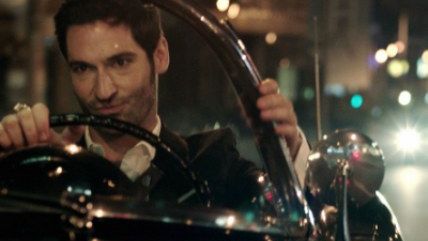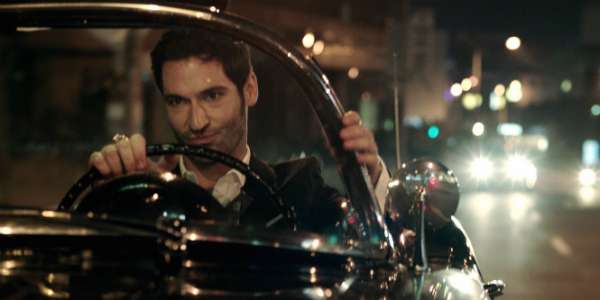Could It Be … Satan?
Where does it say in the Bible the Devil can't moonlight as a detective?

-
'Lucifer,' Fox Lucifer. Fox. Monday, January 25, 8 p.m.
- You, Me and the Apocalypse. NBC. Thursday, January 28, 8 p.m.
There's a brief moment in the pilot episode of Fox's Lucifer when I thought broadcast television had finally fulfilled the prophecy of the late Catholic priest Frank Poncelet, who preached that the tube was no mere boobery but literally the devil's tabernacle.
In the scene that caught my eye, the show's title character—yeah, that Lucifer, who has resigned his position in Hell for a retirement of full-time drunkenness and fornication in Los Angeles, despite ominous warnings from Upstairs that he's in violation of his contract—has just finished counseling a young singer whose career he boosted that the sale of her soul was non-binding. Her spiritual fate, he says, is in her own hands. Her big smile is interrupted by a drive-by hail of bullets, which doesn't faze Lucifer but has terminally inauspicious results for her. The gunman, fatally injured in an accident moments later, confesses it was a paid hit…but dies before he can identify the intellectual author.
What seemed like the obvious explanation—that God, taking that Old Testament stuff a step or two thousand further, had ordered a hit on Lucifer's protege, just to show him who was boss—surely constituted a challenge to mainstream theology that made those old 14 theses look like Hallmark greeting cards, right? God as The Godfather! Soon to be followed, maybe, by Jesus as the hothead Sonny Corleone, or even the dopey Fredo?
Well, wrong. The culprit in the drive-by turns out to be a human driven by purely corporeal concerns. But my brief flight of ecclesiastical fancy is typical of the quirky thoughts you might have while watching Lucifer, an oddly enticing pastiche of rom-com, buddy-cop procedural, and renegade theology.
Loosely based on the comic book series of the same name and written by Tom Kapinos, the lewd genius who produced Showtime's filthily funny Californication, Lucifer stars BBC vet Tom Ellis as the title character. He's in the throes of a mid-eternity crisis, bored with Hell and plagued by existential doubt: "Do you think I'm the devil because I'm inherently evil, or just because dead old Dad decided I was?"
Lucifer's slacking doesn't sit well with his own minions ("Shouldn't you be doing something more significant?" nags one after he returns from a long weekend of unnatural acts with an ambitious model) and even less so with the Big Guy, who dispatches an angel to sternly warn him to quit screwing around with the balance of the cosmos.
Yet it all leaves him unmoved until the murder of the singer, which unaccountably stirs him to go looking for the perpetrator. His investigation gets him mixed up with disaffected homicide detective Chloe Decker (the hypnotically beautiful Lauren German of Chicago Fire and Hawaii Five-O). She's unimpressed with his whole fallen-angel schtick ("Are you at all aware of how dickish you sound?") but lets him hang around because of his uncanny ability to get people to confess their darkest secrets, which is at least as handy for cops as for demons.
That propensity for inducing confessions is about the only infernal superpower Lucifer displays during the pilot episode, unless you count his ability to scare little kids by making his eyes glow hellfire-red. Despite its subject matter, Lucifer is neither a special-effects spectacular nor supernatural thriller. Its considerable charms are built on the foundation of the peculiar, lurching development of a relationship between Lucifer—devilishly suave but slightly unsettled by his unexpected interest in humans beyond the temperature at which they roast—and Chloe, whose early idealism about her job as a cop has curdled into something cynical and solitary.
Her uncertainties about the point of her career mirror those of Lucifer about the nature of good and evil. The show's soft spot for free will over predestination, in this day and age, is not likely to get anybody stoned for heresy. Its portrayal of God as, if not exactly Don Corleone, at least a bit of a bully, is more daring. What's next? A spinoff with Salome as an organizer for a sex worker's union? Something tells me we're not in Flying Nun territory any more, Toto.
Eccentric theology also plays a major role in NBC's You, Me and the Apocalypse. With a gargantuan asteroid hurtling toward an extinction-level collision with Earth in 34 days, a potty-mouthed priest played by Rob Lowe has been assigned by the Vatican to sort out the returning Messiah from the false prophet warned of in the book of Revelations. "The Ecclesiastical turd in the swimming pool!" he gloats.
The priest is one of a collection of seemingly random characters tossed together by the specter of impending doom. Others include Jenna Fischer (The Office) as a timid librarian wrongly jailed for a hack of the NSA that was really done by her teenaged son; Megan Mullally (Will & Grace) as a hilariously unhinged Nazi prison escapee; Italian actress Gaia Scodellaro as a doubting nun; and Brit TV vet Mathew Baynton as a lovelorn bank manager in search of a runaway wife.
You, Me and the Apocalypse is quite funny when Mullally is on-screen and occasionally so at other times. (The bemused U.S. president, upon being introduced to the head of the White House's Apocalypse Planning Division: "We have one of those?") Mostly, though, it suffers from the same madly clashing tones that did in the 2012 Steve Carrell/Keira Knightly apocalypse comedy Seeking A Friend For The End Of The World. Mixing melancholy and humor—even black humor—requires a delicate touch that's lacking in You, Me and the Apocalypse. Not to mention that too many of the jokes don't quite rise to the level of black humor. More like beige.



Show Comments (11)